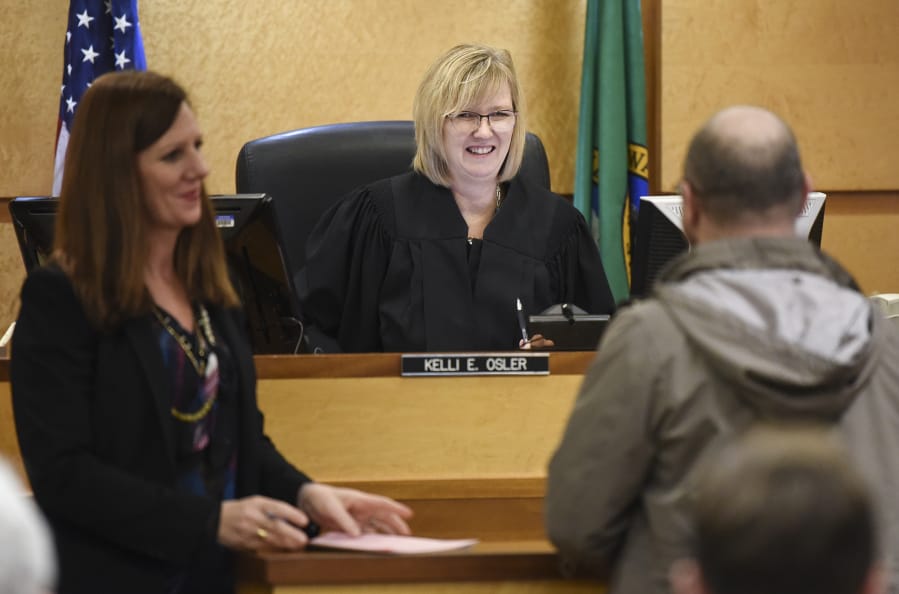Clark County’s long-standing Mental Health Court recently received a major overhaul, most notably with the addition of felony-case referrals. Defendants will also no longer be required to plead guilty for program admission.
The change went into effect about two weeks ago when the court opened it up to felony-case referrals, Clark County Prosecutor Tony Golik said, and indigent defense attorneys underwent training on the referral process. At least one felony referral is already being screened.
Historically, only misdemeanor cases qualified for Mental Health Court. Defendants were required to plead guilty for admission, but upon successful completion of the program, they avoided jail time.
But now, the program is the first pre-plea court in the county; upon successful completion of the program, the defendant’s charge is dismissed.
“Our opinion in this office is that if there is a clear nexus between someone suffering a mental illness and criminal conduct, they shouldn’t end up with a criminal conviction, if the mental illness is the true driving factor or cause of the criminal conduct,” Golik said.
“The trick is figuring out what cases are true mental health cases and not someone gaming the system,” he added.
Golik hopes that the changes will reduce criminal activity, promote public safety and enable participants to be productive members of society, he said.
The changes have been in the works for nearly a year, Golik said. It took time to get all the players on the same page, which includes the city of Vancouver, Clark County Indigent Defense, and Superior and District courts.
Golik said his office looked at other mental health courts in the state when considering changes to Clark County’s court. However, the changes are largely modeled after the county’s Substance Abuse Court, he said.
Mental Health Court, which started in April 2000, will continue as a District Court program, with Judge Kelli E. Osler presiding. Osler has the authority to handle felony cases.
The current capacity for the program is 50 cases, Golik said, but it typically gets about 30 misdemeanor cases. To start, Osler is willing to take a total of 15 felony cases.
“I think we will hit capacity fast,” Golik said.
In addition to Osler, Deputy Prosecutor Bob Shannon, defense attorney Lisa Toth, probation officer Amanda Nelsen and District Court Therapeutic Specialty Courts Coordinator Beth Robinson make up the Mental Health Court team.
Program admission
A number of defense attorneys are waiting in the wings wanting their clients to be screened for the program, Toth said.
“I’m excited because I feel there are a lot of Superior Court cases where we have first offenders or high-risk, high-need clients that fall into the mental health field. There’s no benefit to pleading guilty and either being placed on (Department of Corrections) supervision or having expectations that they can’t fulfill because many of them are homeless,” she said.
The court will have to see how long the felony referral process takes, which is one of Toth’s concerns, she said, because it’s expected to be lengthy.
To be admitted into the therapeutic court, the defendant must be diagnosed with a mental illness from the Diagnostic and Statistical Manual of Mental Disorders, called the DSM-5.
If a defendant has not previously been diagnosed with a mental illness, but one is suspected, they will have to undergo an evaluation. It’s up to the defendant’s defense attorney to ask for the evaluation and advocate for their admission into Mental Health Court.
Golik said victim input will be critical in deciding who will be admitted to the program.
The majority of cases to qualify will likely be general felonies, such as property crimes, and drugs, he said. And there will likely be crossover between the mental health and drug courts. Deputy prosecutors will have to rely on experts to determine if it’s more appropriate for a defendant to enter into mental health or drug court, Golik said.
Felony cases that are disqualified from the program include violent offenses, sex offenses, any offense involving a firearm, vehicular homicide and offenses alleging substantial bodily harm. Anyone currently charged with a DUI is also disqualified.
When a defendant agrees to enter Mental Health Court, they give up their right to a jury trial and stipulate to police reports that could be used in a bench trial, if they don’t complete the program.
Defendants must check in with the Mental Health Court weekly, biweekly or monthly — depending on what phase they are in — and follow a treatment plan, which typically includes medication and counseling. Many are also assisted with finding housing and other resources.
The goal is stability, Golik said.
It typically takes anywhere from a year to 1 1/2 years to complete the program, but the standard is 16 months, which is divided into four, four-month phases.
The current graduation rate is about 35 percent, Golik said. He’s hopeful that will increase with the new changes.
A total of 334 defendants had graduated the program through 2015, according to a 2015 year-end report, the most recent available online. Approximately 57 percent of accepted referrals opt into the program. The five-year recidivism rate for graduates is 20.2 percent, according to the report.
The court is made up of 43.48 percent county cases and 56.52 percent city cases.
Looking to the future
Golik said he’s hopeful that Mental Health Court will expand, and the felony cases, which are handled by the county, will split off into a full Superior Court program.
“I’m really excited about the program. I believe it’s a smart approach to the criminal justice system,” Golik said, adding that the new court is better than housing defendants who are suffering a mental illness in the jail.
However, the defense bar is somewhat skeptical of the pre-plea approach, Toth said, because based on years of experience, attorneys know a lot of clients suffering from a mental illness have a difficult time complying and showing up to court. She said there are definitely some reservations about that change.
“As a prosecutor’s program, we as a defense bar, we always have some reservations about their policies and procedures, but the overall goal is to offer something different to this clientele and hope that the community as a whole grows to better support these guys,” Toth said.
“The more participants we get, the more we can fine-tune it,” she said. “I’m excited to move it forward and hopefully have it continue to evolve and meet the needs of this population.”




